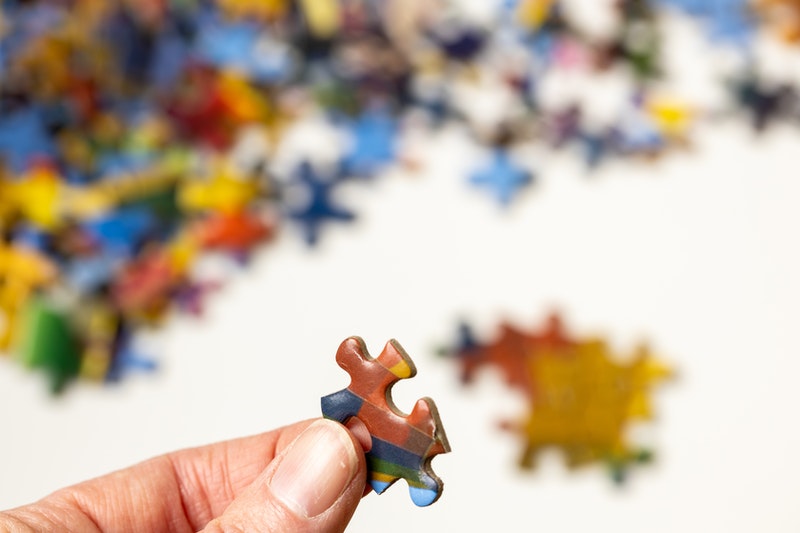10 Health Benefits of Jigsaw Puzzles

In my family, there’s always a large 1000 piece jigsaw puzzle out at Christmas. We spend spare time over the holiday putting the pieces back together and often forming a hilarious festive scene. My mum tends to buy a new one every year and it makes for fun family time over the festive period. However, should we be getting involved in jigsaw puzzles all year round?
For many years, we’ve known that physical exercise keeps our bodies strong and now scientific evidence suggests that mental exercise keeps our brains young. While 65 was long thought to be the starting point for cognitive decline, a new study out of Harvard shows that women experience memory loss several decades before that. Having witnessed the mental decline of 3 grandparents I am passionate about learning how to put this off for as long as possible.
With this in mind, today I am going to tell you about 10 benefits which come from regular playing of jigsaw puzzles!
- Escape Screens – These days everything seems to be digital and although we can’t escape technology we can choose to put down our phones and turn off our TVs for a few minutes to work on a puzzle. The Works has a brilliant selection of discount jigsaws, ideal for all age groups, so there’s no excuse to sit in front of a screen all day!
- Time to relax – Modern life is so hectic with work taking up so much of our time it’s hard to do things we enjoy like taking part in hobbies or simply getting a few moments to ourselves to relax. Jigsaw puzzles offer an escape from stress and nurture a sense of calm sometimes described as ‘meditative’, helping us tackle anxiety and stress.
- Helping focus – It can be hard to concentrate on one particular thing these days with our lives being so busy, juggling all manner of tasks with our phones beeping and vibrating away in our pockets. Puzzles flex our creative muscles, meaning that they can actually help nurture and develop our creativity as well as retraining us to focus on one small thing at a time.
- Greater Attention to Detail – Puzzles also help improve our attention to detail. When solving a puzzle, especially if the pieces are very similar, it is crucial to pay attention to details. The ability to capture small details can help us in all aspects of our lives, especially at work. When we are more detailed and precise, the quality of our work improves. There is the added bonus of a boost to our visual-spatial reasoning which helps when driving a car, packing, using a nap, learning and following dance moves etc.
- Dexterity – As someone who suffers from De Quervain’s Tenosynovitis I can tell you that a lack of mobility in hands/wrists can be very frustrating. When I have a flare-up the smallest of movements can be very painful. Puzzles can help give our fingers a gentle workout. For kids, puzzles can help develop hand-eye coordination, gross motor skills and fine motor skills and for adults, it gives us the chance to exercise our hands and retain dexterity which may otherwise slip away.
- Connect with People – Angela Geiger, chief strategy officer for the Alzheimer’s Association noted that there is some evidence people may benefit from staying socially engaged with friends, family and the community. People who develop dementia often end up isolated which only worsens their decline. What better way to connect with friends and family than over a good puzzle? Yale University researchers found that when workers can puzzle together in the workspace it helped them improve their relationships and the ability to cooperate and teamwork.
- Increased productivity – when you are happier and less stressed your concentration improves, your productivity skyrockets. Many offices are beginning to include puzzles and similar games in their resting areas. These games help employees disconnect from work for a few minutes and come back refreshed and ready to start again.
- Better mood – don’t you love that feeling when you solve a puzzle? The dopamine rush gives you a great high and feeling of achievement. Dopamine is responsible for regulating mood and optimism; it also affects learning, memory, concentration, and motivation so whenever we solve a puzzle, or simply, put a puzzle piece in the correct place, we get a little mood boost.
- Increase in problem-solving ability – solving a puzzle isn’t always easy, especially if you have lots of pieces or a difficult picture to put back together. Trying out different approaches to try and solve a puzzle helps develop your skills at forming and testing hypotheses them to find the right solution. You may have to change your perspectives several times when something doesn’t go as planned, so your trial and error skills get a work out!
- Prevent Dementia – Puzzling stimulates the brain and actually wards off the plaque that is the marker of Alzheimer’s, according to a recent study published in the Archives of Neurology. The study compared brain scans of 75-year-olds to 25-year-olds. The elderly people who did puzzles regularly had brain scans comparable to the 25-year-olds.
So, do you think it’s time to invest in some jigsaw puzzles?





